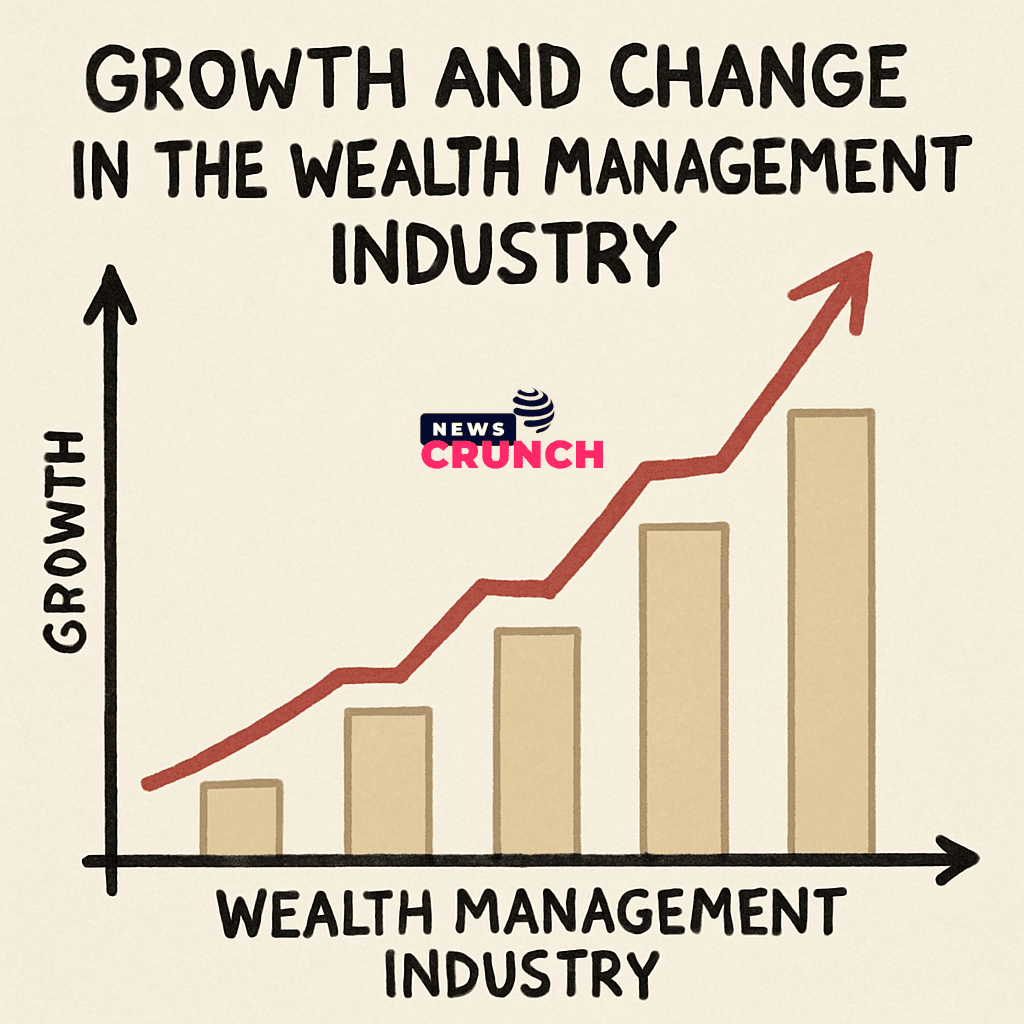
Wealth management is changing fast, and by 2025, it will look very different from what we see today. Technology is leading the way, with AI offering more personalized advice and robo-advisors becoming smarter at building investment strategies. Clients now expect not only better results but also more transparency and convenience in how their finances are handled.
At the same time, investor priorities are shifting. Sustainable and ESG-focused investments are growing as people look for ways to align money with their values. Blockchain is adding extra security and trust to transactions, while new regulations continue to shape how firms operate. To keep up, wealth managers must focus on putting clients first, blending innovation with reliability.
The Evolving Landscape of Wealth Management
The wealth management industry is experiencing a dynamic shift. Traditional methods are giving way to innovative practices. This transformation is driven by emerging technologies and evolving client needs.
Financial technology, or fintech, is a major catalyst. It’s revolutionizing the way wealth management services operate. Enhanced digital tools are streamlining operations and improving client experiences.
Clients now expect more personalized, efficient services. Data analytics plays a critical role in meeting these demands. Understanding market trends and client needs requires deep data insights.
Future wealth management strategies will focus on key elements:
- Integration of advanced digital tools
- Adoption of client-centric models
- Emphasis on sustainable and ethical investments
Emerging markets are also influencing the industry’s direction. The global wealth management market is set for significant growth. Firms are exploring new opportunities in untapped regions.
In this evolving landscape, wealth management firms need agility. They must balance traditional approaches with cutting-edge innovations. Embracing change is essential for sustained success.

Key Wealth Management Trends in 2025
In 2025, the wealth management industry will undergo pivotal changes. Trends will focus on digital innovation and sustainability. These shifts will redefine how wealth is managed globally.
Rising demand for personalized services will take center stage. Clients expect tailored financial advice beyond traditional investment. Wealth management firms are adapting to meet these individualized expectations.
Sustainable investing is gaining prominence as well. Investors are more aware of ESG (Environmental, Social, and Governance) criteria. Incorporating these factors into portfolios is becoming standard practice.
Technological advancements are also crucial. Artificial Intelligence (AI) will drive data analytics, providing deeper insights. This will empower advisors to offer strategic, informed investment options.
Key wealth management trends in 2025 include:
- Enhanced AI-driven analytics for personalized service
- Integration of ESG principles in investment strategies
- Increasing use of robo-advisors for efficiency
- Expansion of digital-only platforms for ease of access
Navigating regulatory changes is another important trend. Firms must stay compliant while innovating. This balance will be essential for long-term success.
The landscape is evolving, but opportunities abound. Future-ready firms will leverage these trends for strategic advantage. The industry must embrace change to thrive in the coming years.

by ANTIPOLYGON YOUTUBE (https://unsplash.com/@antipolygon)
Digital Transformation and Fintech Integration
Digital transformation is reshaping wealth management, making it more efficient. Fintech integration is at the forefront of this evolution, bringing innovation to the industry. These technologies are driving enhanced client experiences and streamlined operations.
The adoption of fintech solutions is accelerating. Wealth management firms leverage these tools to improve service delivery. This includes real-time data access and automated processes.
Key areas of fintech integration include:
- Real-time data analytics and reporting
- Seamless client onboarding and management systems
- Automated and streamlined back-office operations
- Advanced risk management tools
Cloud computing plays a central role in this digital shift. It offers scalability and reduces operational costs. Firms can now expand their services with greater flexibility.
Digital transformation also enhances cybersecurity. As digital platforms grow, so does the need for robust security measures. Protecting client data is a top priority for wealth management firms.
Embracing fintech is not just an option; it’s a necessity. It equips firms to meet evolving client demands. By integrating these technologies, firms ensure they stay competitive in a rapidly changing environment.

by Markus Spiske (https://unsplash.com/@markusspiske)
The Rise of Artificial Intelligence and Robo-Advisors
Artificial Intelligence (AI) is transforming wealth management, making services smarter and more efficient. AI helps in analyzing large data sets to provide insights that were previously unattainable. This technology plays a crucial role in personalizing financial advice for clients.
Robo-advisors are an AI-driven innovation, offering a more hands-off investment strategy. They manage portfolios using algorithms tailored to the client’s financial goals. This approach democratizes access to advanced financial advice, making it affordable for a wider audience.
Key benefits of AI and robo-advisors include:
- Personalized investment strategies
- Cost-effective portfolio management
- Constant portfolio monitoring and rebalancing
- Reduced human error in financial decision-making
AI is not just about automation; it enhances the advisor-client relationship. By taking over routine tasks, it allows advisors to focus on complex financial planning. This leads to more meaningful client interactions and improved satisfaction.
The rise of AI and robo-advisors signals a shift towards a hybrid model. This model combines digital efficiency with human insight. Embracing this change ensures wealth management firms remain competitive.

by Ivan Rohovchenko (https://unsplash.com/@ivrn)
Personalization and Client-Centric Wealth Management
As we move toward 2025, personalization becomes more vital in wealth management. Clients expect services tailored to their unique financial situations. This shift necessitates a client-centric approach that prioritizes individual preferences and goals.
Understanding client needs requires wealth managers to employ advanced data analytics. Analyzing trends and behaviors allows for more precise, customized offerings. These tailored solutions enhance client engagement and satisfaction, fostering long-term relationships.
Key elements of client-centric wealth management include:
- Tailored investment strategies based on individual risk tolerance
- Personalized financial planning and goal setting
- Regular communication and updates tailored to client preferences
- Incorporation of client feedback in service improvements
Clients now seek more than generic advice; they want a holistic financial experience. Wealth management firms must adapt to this demand. By focusing on personalization, firms not only meet client expectations but also gain a competitive edge in a crowded market.
Sustainable and ESG Investing: The New Standard
In recent years, sustainable and ESG investing has shifted from a niche to a mainstream strategy. By 2025, this trend will become the new norm in wealth management. Investors increasingly focus on how their portfolios impact society and the environment.
ESG criteria guide investment decisions by assessing companies on environmental, social, and governance factors. This approach balances ethical concerns with financial returns. As a result, more firms integrate ESG considerations into their investment frameworks.
The benefits of ESG investing include:
- Alignment with personal or institutional values
- Potential for reduced risk through responsible practices
- Opportunities for long-term returns with sustainable growth

Wealth managers must prioritize ESG to meet client expectations and enhance portfolio performance. As awareness of climate change and social issues grows, adopting sustainable strategies is not only wise but essential.
Blockchain, Cybersecurity, and Data Privacy
Blockchain technology is set to revolutionize the future of wealth management. By enhancing transparency and security in financial transactions, it assures clients of the safety of their wealth. Blockchain’s ability to create immutable transaction records reduces fraud risks significantly.
As digital platforms grow, cybersecurity becomes paramount for wealth management firms. Safeguarding sensitive client data is crucial to maintaining trust. Firms must invest in advanced security measures to protect against cyber threats.
Data privacy is also at the forefront, ensuring clients’ information is handled with utmost confidentiality. Regulations like GDPR exemplify the global move towards robust data protection frameworks. Wealth management firms must adapt to these evolving requirements.
Benefits of embracing blockchain and cybersecurity include:
- Enhanced transparency through secure digital ledgers
- Reduced risk of cyber-attacks and data breaches
- Compliance with stringent global data protection laws

Adopting these technologies enhances operational integrity and strengthens client relationships in the digital era.
Regulatory Changes and Compliance Challenges
In 2025, regulatory changes will significantly impact the wealth management industry. Firms must remain agile to navigate evolving compliance landscapes. Understanding and adapting to new policies will be crucial for continued success.
Compliance challenges will arise as new regulations aim to enhance transparency and protect investors. Wealth management firms need to ensure strict adherence to these rules. They must integrate these policies into their operations seamlessly.
Key considerations for compliance include:
- Keeping updated with international regulatory changes
- Ensuring transparency in all client dealings
- Implementing robust internal compliance programs
Staying proactive in compliance not only mitigates risks but also builds trust with clients and regulators alike.
The Human Touch: Evolving Role of Advisors
In the future, wealth advisors will focus more on complex planning and relationship management. As technology handles routine tasks, advisors will provide deeper insights. Their role in connecting with clients will become indispensable.
Advisors will help clients navigate intricate financial landscapes. They will address unique challenges and offer tailored solutions. Building long-term relationships will be a priority, requiring genuine engagement and empathy.
To thrive, advisors will need to:
- Enhance their interpersonal skills
- Focus on holistic financial planning
- Leverage technology for better decision-making
The personal touch remains irreplaceable in wealth management. Advisors will combine digital tools with human insight, ensuring clients receive the best of both worlds.

by Sebastian Herrmann (https://unsplash.com/@officestock)
The Future Client: Generational Shifts and New Expectations
The clientele in wealth management is rapidly evolving. Younger generations, especially Millennials and Gen Z, bring fresh perspectives. They demand more from their financial advisors.
Tech-savvy and value-driven, these clients seek transparency. They prefer engaging platforms and services aligning with their lifestyles. Fast, efficient, and tailored experiences are their norm.
Wealth management firms should adapt by:
- Offering tech-integrated solutions
- Providing clear, transparent fee structures
- Embracing ethical and sustainable practices
Meeting these expectations will require constant innovation. Successful firms will tailor their services to appeal to new and future clients. Remaining flexible and attentive to evolving demands is key.
Holistic Financial Wellness and Innovative Offerings
Wealth management is shifting toward holistic well-being. Clients are increasingly interested in total financial wellness. This includes more than just investment growth.
Advisors must consider factors like debt management and financial education. Lifestyle planning is also becoming critical. Innovative financial products can cater to these diverse needs.
Firms can enhance offerings by:
- Integrating wellness-focused services
- Providing educational resources for financial literacy
- Developing products addressing varied financial goals
Encouraging a comprehensive approach helps in building stronger client relationships. It keeps clients engaged and informed. Ultimately, focusing on holistic financial health will be essential for future success.
Globalization, Emerging Markets, and Inclusive Wealth Management
Globalization is reshaping the wealth management landscape. Emerging markets offer new growth opportunities. They are becoming increasingly influential.
Inclusive wealth management involves addressing the needs of diverse populations. It also means catering to underserved clients. This approach broadens the client base.
Key strategies for firms include:
- Expanding into emerging markets
- Offering inclusive financial products
- Building culturally aware advisory teams

by Alin Andersen (https://unsplash.com/@onixion)
By focusing on inclusivity and globalization, wealth management firms can tap into new demographics. This can enhance their growth potential significantly. Addressing these shifts will ensure their place in the future economy.
Preparing for the Future: Strategies for Wealth Management Firms
To thrive, wealth management firms must adapt to evolving trends. Innovation is key to meeting future demands. Firms must be proactive rather than reactive.
Embracing digital transformation enhances client engagement. Tailored, technology-driven services add significant value. Additionally, adapting to regulatory changes is crucial.
Key preparation strategies include:
- Investing in AI and machine learning tools
- Developing personalized client experiences
- Enhancing cybersecurity measures
By focusing on these strategies, firms can secure a competitive advantage. This proactive approach will ensure they meet future client expectations. Ultimately, it solidifies their relevance in a rapidly changing landscape.
Conclusion: Embracing Change in the Wealth Management Industry
The wealth management industry stands on the brink of transformation. Firms must harness emerging technologies to remain competitive. Success depends on adaptability and foresight.
Client needs are evolving rapidly. Personalized services and transparent operations are now imperative. Embracing these changes will build lasting client trust.
Ultimately, the future of wealth management is promising for those willing to innovate. By aligning with key trends, firms can secure success and drive future growth. Embracing change is not just an option; it’s a necessity for survival in this dynamic landscape.
FAQs About the Future of Wealth Management
1. How is wealth management changing by 2025?
Wealth management is moving toward digital innovation, personalization, and sustainable investing. AI, robo-advisors, and blockchain are shaping how services are delivered and trusted.
2. What role does technology play in modern wealth management?
Technology like AI and fintech tools improves efficiency and personalization. They help advisors deliver tailored strategies while ensuring secure and transparent transactions.
3. Why is ESG investing important in wealth management?
Sustainable and ESG-focused investments align financial growth with ethical values. By 2025, they will be standard practice for most wealth managers and investors.
4. What are robo-advisors in wealth management?
Robo-advisors are AI-driven platforms that provide automated, affordable investment advice. They allow clients to access personalized strategies without high advisory fees.
5. How is blockchain influencing wealth management?
Blockchain adds security and transparency to financial transactions. It reduces fraud risks and builds stronger trust between wealth managers and clients.
6. What challenges do wealth management firms face in the future?
Firms must balance regulatory compliance with innovation. Adapting to client-centric models, cybersecurity demands, and global market changes will be essential for long-term success.







